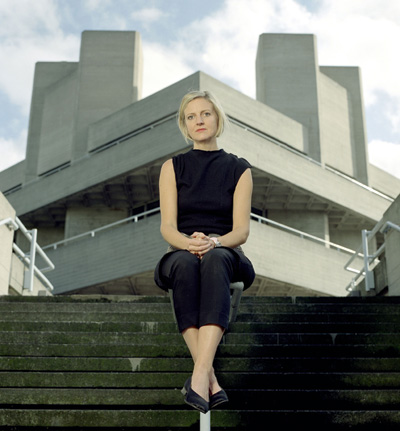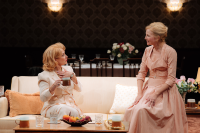Ah! Here comes the girl from the temping agency. That’s my first reaction when I meet Marianne Elliott, director of the global hit War Horse, and winner of this year’s Olivier for her work on The Curious Incident of the Dog in the Night-time. She’s a trim, attractive fortysomething with a neat blonde bob and she wears a shrill turquoise blouse of the kind favoured by Romford copy typists in the 1980s. Her blue eyes are amazing — huge, screen-goddess orbs, which shine with an exceptional brilliance and clarity. She’s two weeks into the rehearsal period for her next play, Sweet Bird of Youth, at the Old Vic, which stars Kim Cattrall. ‘And how are the actors? Complaining like mad?’
‘They’re a great bunch,’ she says, taking a discreet glug from a Styrofoam cup of broth. It’s lunchtime but she rarely gets a minute to herself during her 16-hour rehearsal days. ‘It’s fascinating to work on Tennessee Williams. It’s like doing a different job. Normally, I do my usual thing, I prep on the text, to the hilt, until I think I know what it is. But when the actors get up and do it, it becomes something else. Something else comes into the room. And you realise everything’s different, the objective is different, the tone is different, because he wrote so subconsciously, especially with the later plays, because he was off on drugs most of the time. And it’s very raw, it’s very ugly, it’s very out there.’
Kim Cattrall plays a fading Hollywood beauty and she was initially reluctant to take the part. The pair first met while Elliott was in New York to oversee the Broadway transfer of War Horse. ‘We had various conversations, but then I think we both got a bit scared about the play. We both felt, maybe Kim’s not old enough for it yet, and then time went on, and I read it again, and said to Kim, “Come on, we want to do something together. This hits the nail on the head in terms of what it means for us to get older as women, what it means to be a star who is very well known and how she keeps up that profile. And all that stuff. Let’s do it.” And Kim was “OK! Done!”’
In conversation, Elliott has an air of brisk, understated efficiency, and an obvious dislike of flowery language. Her favourite intensifying adverb is ‘really’ and if she wants to add further reinforcement she just says it twice. Her directing career began more or less by accident and she received no formal training. At university she studied drama and she discovered that she hated acting. ‘My father was a director and I thought directors were male. I honestly thought I could never do it.’ She was 28 when she took her first steps in the profession. ‘I was friends with two playwrights and we were all bored and hating our menial jobs and we just decided, as a bit of fun really, to set up a theatre company. In our holidays we’d rehearse in the bedroom of my flat and stage our shows on the fringe. It just went from there.’ Manchester Royal Exchange asked her to become an associate and she later won the job of artistic director. Then she moved to the Royal Court and became an associate at the National. Unlike most directors — whom she describes as ‘quite a competitive, self-protective race’ — she likes to collaborate with her peers. ‘I’m really fascinated by other directors’ methods. I’ve done a lot of learning by
observation.’
Is she inspired, or frustrated, by seeing other directors’ work on stage? ‘Ummm, it’s inspiring if it’s really good or if it’s really bad. It’s inspiring if it gets your juices going, especially if the play’s really good. A really good play done really, really well, then it’s, Ahh, God!’
She has no road map for the future. ‘You can only ever live for the next few years because you don’t believe it’s actually going to go on much longer than that. And it might not,’ she says. She has dabbled in celluloid and made a short film, ‘which wasn’t very good but I learnt a load about it. I’d love to make a [feature] film. I’m not sure I’d be any good at it. But I think the glamour of the silver screen is probably a great carrot.’
In the summer she’ll start work on a new musical, The Light Princess, written by Tori Amos, which opens in the Lyttelton in the autumn. ‘It’s a crazy, mad fairy tale about a princess who has no gravity. She refuses to come to earth. She’s floating. In the second half she does find gravity but in water. So in the second half she’s swimming.’ Sounds like a risky project? ‘Hugely risky. It’s terrifying.’
And what’s Tori Amos like? Completely bonkers? ‘She’s amazing. Really focused. You don’t survive in that industry for long unless you’re really focused and she’s been around for a good innings. I come from theatre and she comes from music and I don’t really know a huge amount of music, and she doesn’t know a huge amount of theatre. But we’re really working together very hard to try and find the same language. Which is thrilling because she’s incredibly open.’
Elliot is a fan of Nicholas Hytner but has no desire to replace him as NT supremo. ‘Two reasons: I have a young daughter and I want to be spending time with her as she grows up. And I’m not suited to running a building. I don’t really have that kind of talent. What I like to do is to close the door on a rehearsal room and explore things.’
She’s a passionate supporter of the subsidised arts and she mounts a spirited defence of state-funded theatre. In the commercial sector productions are rehearsed for four weeks but the National allows six weeks because a show’s profitability — ‘the end result’ as she calls it — is far less important.
‘It’s impossible to feel the creative juices flowing if you’re always worried about the end result. I think really, really good work comes out of people being quite open, not stressed, really exploring, trying to be imaginative, without worrying too much about the end result. And being allowed to fail, really being allowed to fail. In the subsidised sector, that is an unwritten rule. Nobody talks about the money. Nobody says: “This has to be a success.” If you put a blank canvas in front of Matisse and say, “This has to be a success,” who’s going to pick up a paintbrush?’







Comments